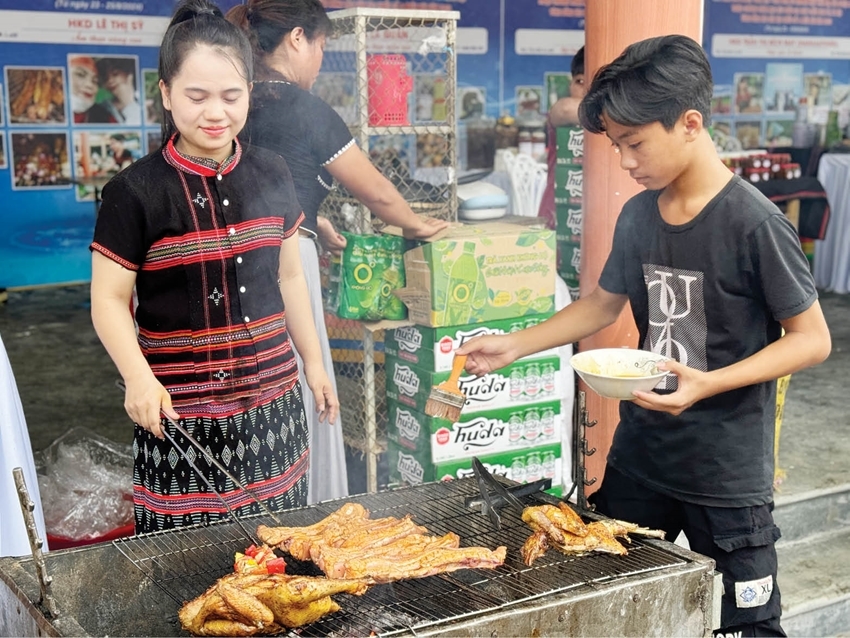 |
| Tourists come to highland markets to enjoy local specialties |
Driving economic growth
Nam Dong market, first held in March 2023 at Nam Dong District Cultural Center, quickly captured the attention of both locals and tourists. More than 50 stalls showcased a variety of products, including agricultural produce, OCOP products, Zeng textiles, herbal rice wine, and signature dishes such as bamboo rice, free-range pork, and wild vegetables.
The market fosters trade connections while helping residents increase their income. Ms. Ho Thi Men, a vendor at the market shared: “Previously, we only grew vegetables for personal consumption, but now we tend to our gardens more carefully to ensure a steady supply of produce for sale twice a month. This has improved our family’s finances, allowing my children to receive a better education”.
Nam Dong market is held regularly twice a month on the Sundays of the second and the last weeks. It not only attracts locals but also connects visitors from far and wide, who come to shop for local specialties and explore the unique culture and hospitality of the area.
In A Luoi, the market is held on the final weekend of each month, featuring specialties such as Ganoderma mushrooms, forest honey, smoked meat, black glutinous rice, Ra Du rice, and ginseng wine. All these products are handmade by ethnic minorities, ensuring high quality and a distinctive mountain identity.
Ms. Ho Thi Hong, a trader, said: “Since selling at the market, I’ve gained regular customers. Tourists now recognize our local specialties, such as smoked buffalo and beef, ginseng wine, and forest honey. All products have clear origins and are highly sought after”.
A Luoi market also serves as a platform for cultural exchange and learning economic practices. Traditional dishes like bamboo rice, “ta luc ta lao” porridge, stream fish, and stone snails make the market a delightful destination for those looking to savor the flavor of the mountains.
Expanding connections
To expand markets and promote the consumption of ethnic minority products, the provincial Farmer’s Association organized the first highland market in Hue City in late July 2024. The three-day event brought together dozens of stalls from mountainous districts, showcasing OCOP products, handicrafts, agricultural goods, and unique cuisine.
Unlike spontaneous markets of the past, the highland market in Hue City was professionally organized, creating favorable conditions for vendors to showcase their products and for visitors to shop with ease. In addition, the highland market also provided the ethnic communities to promote their culture through Zeng weaving, herbal rice wine production, traditional dances, and songs.
Highland markets not only bring economic benefits but also contribute to preserving and promoting the cultural heritage of ethnic minorities. For the people, these markets are places of trade, income generation, and cultural bridges, igniting pride and elevating the value of local products.
Ms. Nguyen Thi Thanh, Deputy Head of the Agriculture and Rural Development Department in A Luoi, informed: “The market helps ethnic people connect with larger markets, consume their products, and gradually build a commodity-based economy. It’s also an opportunity for sustainable livelihood development, increased income, and improved living standards”.
The markets also serve as highlights in the local tourism development journey. Besides shopping for unique products and learning about local culture, visitors to Nam Dong and A Luoi seek out the market experience to immerse themselves in the highland way of life.
From the success of these markets, local authorities and related organizations plan to replicate the model, not only in Nam Dong and A Luoi but also in other regions. Maintaining and developing highland markets will continue to drive socio-economic development for ethnic minorities, contributing to poverty reduction and sustainable development.
However, to enhance the effectiveness and participation in highland markets, local authorities and departments should organize more training programs to improve production skills and product promotion. Additionally, investments in transportation infrastructure and digital transformation should be prioritized to help locals access larger markets.
Highland markets have been creating positive impacts on economic development and cultural preservation. With the support of the government and the efforts of local residents, these markets will remain a beautiful symbol, enriching the cultural identity of the ancient capital.